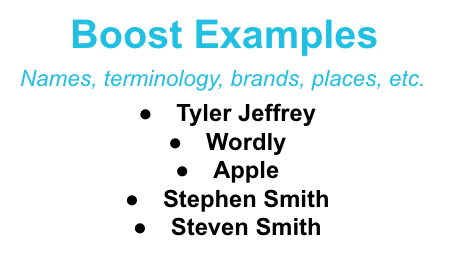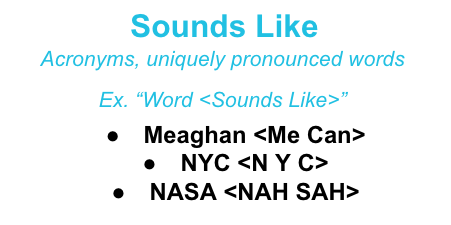About the Boost List in Glossaries
How a boost list in your glossary increases accuracy
A boost list in the glossary is a list of words that a speaker might say but may not be common in the language the speaker is using. Adding a word to the boost glossary increases the likelihood that the word will be recognized correctly.
The boost glossary is used to nudge Wordly's translation software. If you want to force Wordly to choose one word over another, create a replace list.
You add boost terms to the glossary under the Boost tab in the Add Glossary window.
With a boost glossary, you can:
- Teach Wordly specific terminology that's used by your organization.
- Guide Wordly to choose the correct word among similar-sounding words.
- Emphasize important terms.
Read Best Practices for tips to maximize your boost list for your glossary.

Add words specific to your organization
You can add words and phrases to your glossary that are specific to your organization. Good words to add to a boost glossary include unusual or specific terminology for your organization, such as:
- Names of people, organizations, places, products, and groups.
- Technical terms, key phrases, and industry specific jargon.
- Acronyms and abbreviations. Example:
- FBI
- CIA
- STD
- DARPA
- NATO
- AI
Only include abbreviations you expect will be spoken aloud as abbreviations. For example, we can expect people to say “Nevada” and not “en vee” (NV), so NV shouldn't be included.
However, we can expect people to say “aye eye” (AI) instead of “Artificial Intelligence,” so AI should be included.
Clarify Words that Sound Similar (Sounds Like)
While most of the time the boost list will get the word you need, sometimes a uniquely spelled name, unexpectedly pronounced acronym, or a product that sounds like another word may not transcribe as desired. To correct this, you'll need to add these similar-sounding words to the boost list.

Example: You're speaking about the benefits of Wordly translation. However, during the meeting, the translation displays "Wordly" as "weirdly". To prevent this, in the Boost list, type the desired word (Wordly), type a left angle bracket (<), list the soundalike phrases (weirdly, weir), and a right angle bracket (>). Separate each phrase with a comma.

Clarifying words that sound similar in the boost list is important when words are spelled in an unconventional way.
Example: You want to talk about the recording artist, Ke$ha. If you don't specify the spelling in the Boost list, Wordly may display Ke$ha like Kesha:

To correct this, type Ke$ha <Kesha> in your Boost list in the Add Glossary window.

When this is entered into the Boost list, Wordly can display the correct spelling of Ke$ha.
You can also clarify similar sounding words in a Replace list. However, Wordly always follows the rule you define in the Replace list, even when different terms may be better.
Emphasizing Terms
Emphasis can improve the accuracy of Wordly’s transcription quality by expanding how the sounds that make up a word are processed.
To add emphasis to a word, enter the word into the phrases field, add a space after the word, and either 1 or 2 exclamation marks. Examples:
- Wordly !
- Moishe !!
- Acetaminophen !!
- Parasetamol !
- Chevrolet !
- Porsche !!
If a word isn’t being transcribed correctly, try emphasizing it with 1 exclamation mark. If it still isn’t being transcribed, use 2 exclamation marks.
Wordly prioritizes the correct transcription of emphasized words over non-emphasized, similar-sounding words. For example, Porsche might be mis-transcribed as porch if the word isn’t emphasized.
Emphasis should be used sparingly, and only for words that are either critically important or for words that can be anticipated in advance to cause problems with transcription efforts.
Boost List Best Practices
The following suggestions will improve your boost list for your glossary:
- Your boost list should be short. Five words or less is optimum.
- Enter terms as spoken, not necessarily as written.You shouldn't have special characters or abbreviations.
Example: If a "Dr. Vazquez" is spoken about, you should enter "Doctor Vazquez" in your boost list. "Dr. Vazquez" won't be matched with the list. - Entering phonetic pronunciation in angle brackets can help.
Example: Scott McEachen <scott mi ee in>
